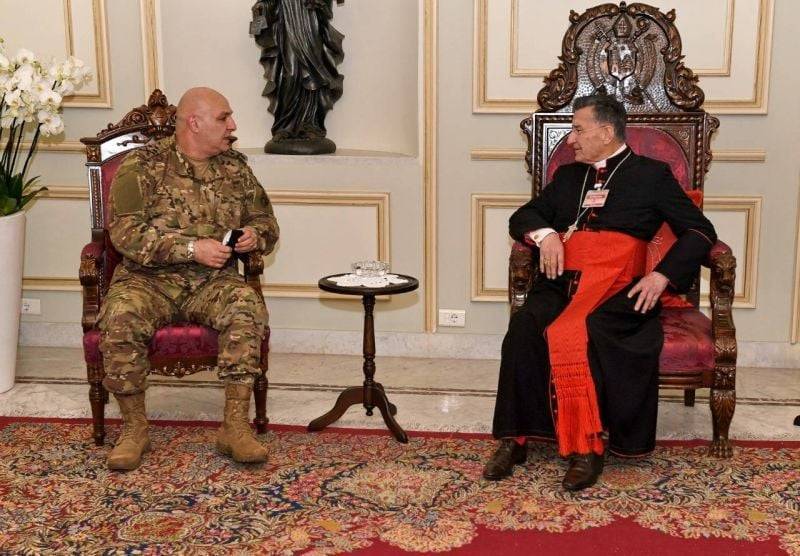
Maronite Patriarch Bechara Rai receiving General Joseph Aoun in Bkirki, April 9, 2021. (Credit National News Agency)
His position was firm… up to a point.
In his Sunday homily, Maronite Patriarch Bechara al-Rai rejected the notion of “appointments [made out] of necessity,” referring to the caretaker cabinet’s disputed ability to appoint a new central bank governor during a presidential vacancy.
However, in the same speech, the prelate also urged the cabinet to fill the three military council posts that have been vacant since December.
This “last resort” avoids a vacancy at the head of the Lebanese Army, a position which is dear to the Maronites, amid an unstable and political climate.
‘The last pillar’
“The Lebanese Army is the last pillar of the state that is still standing, and the Maronite patriarch fears, above all, to see it rendered uncertain,” a source within the Church told L’Orient-Le Jour.
The army is in danger of facing a serious and unprecedented vacuum. The three posts that have been vacant since December include chief of staff (traditionally reserved for a Druze), inspector general (traditionally reserved for a Greek Orthodox) and director general of administration within the military council (traditionally reserved for a Shiite Muslim).
Caretaker Defense Minister Maurice Slim, who is close to the Free Patriotic Movement (FPM), has refused to endorse the appointments, arguing that a caretaker cabinet is not empowered to fill these vacancies.
Contacted by L’Orient-Le Jour, Slim declined to comment, saying he did believe he was “targeted” by the patriarch’s remarks.
Although these posts are not Grade One army positions, they remain sensitive, particularly the chief of staff post. The person is empowered to act as interim army chief (a position traditionally reserved for a Maronite) in the event of a vacancy. Current Army Commander-in-Chief General Joseph Aoun, is due to retire in January 2024.
If a president is not elected by then — a scenario that is far from impossible — it will be difficult to appoint a successor, and there will be no one serving as acting army chief.
“No one can take [interim] charge of the army, with the exception of the chief of staff who deputizes for the commander-in-chief,” said Gen. Aoun in late June.
Following a meeting with Gen. Aoun on Monday, Grand Mufti Sheikh Abdel-Latif Derian called for the protection of the Lebanese Army and security services by filling vacant positions.
But because Bkirki deems the “appointment of necessity” of a successor to BDL Governor Riad Salameh’ — whose term of office expires on July 31 — as unconstitutional, some point to a contradiction in the Maronite Church’s position.
“Why can’t a cabinet able to appoint the army chief of staff constitutionally appoint a BDL governor?” asked Hassan Rifai, an expert in constitutional matters. Although the posts are of different categories, Rifai said he believes that the patriarch’s position is “political in nature.”
Even the Lebanese Forces (LF) are opposed to appointments to the military council.
“The Constitution, which does not allow a caretaker cabinet to take this kind of step, must be respected,” said Charles Jabbour, spokesman for the LF.
The Maronite Church denied any contradiction in Rai’s position.
“In the central bank’s case, there is a clear legal framework [Code of Money and Credit]: the vice-governors must act as interim governors and cannot shirk their responsibilities. In the army’s case, however, we are heading to an absolute vacuum,” said the above-mentioned Church source.
A campaign
The risk of chaos within the army command is all the more worrying for Bkirki given that the security situation in Lebanon is far from ideal.
Against a backdrop of political and economic crisis, security incidents are multiplying. The latest was the tragedy at Qornet al-Sawda earlier this month, where two men from the predominately-Christian village of Bsharri were killed in an alleged dispute over water sources with residents of the predominately-Sunni village of Bqaa Safrin locality in Dinnieh.
“We believe in the state, we know our boundaries and we know the murderer, this is not just an incident,” Rai said after the incident.
While many feared that the case would degenerate into a sectarian confrontation, calm was quickly restored, thanks in particular to the army’s intervention.
On the other hand, the situation on the country’s southern border with Israel has been tense for several weeks, and the risk of a new confrontation between Hezbollah and the Israeli army cannot be ruled out.
Alongside the United Nations Interim Force in Lebanon (UNIFIL), the army plays a key role in maintaining calm at the border. It is in fact Gen. Aoun’s ability to maintain stability that increasingly makes him a serious candidate for the presidency, particularly in the eyes of certain Arab and Western capitals.
Historically, the army chief is often considered to be the consensus presidential candidate by default — the military institution’s command being seen as the most prestigious post reserved for Maronites after the presidency.
“We fear a campaign to create a vacancy in all the major posts [reserved for] Maronites, especially Baabda [presidency] and Yarze [army],” said the source within the Church.
These fears are expressed at a time when Hezbollah is quietly calling for constitutional amendments and a rebalance of the state’s sectarian structure in exchange for giving up their endorsement of presidential candidate Sleiman Frangieh. Hezbollah denies this claim.
Frangieh faces opposition from the overwhelming majority of Christian forces, who consider themselves to be essential to the election. But Amal and Hezbollah maintain their position and will block the election of any head of state other than their candidate, considering that the “resistance” needs “guarantees.”
It is not certain, however, whether the Christians are ready to provide them.
This article was originally published in French in L'Orient-Le Jour. Translation by Joelle El Khoury.